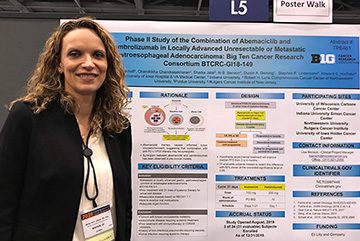Jan. 24, 2020:
Nataliya Uboha, MD, PhD, assistant professor in the Department of Medicine at the University of Wisconsin School of Medicine and Public Health, presented a poster highlighting the Big Ten Cancer Research Consortium’s BTCRC-GI18-149 study during the American Society of Clinical Oncology’s 2020 Gastrointestinal Cancers Symposium in San Francisco.
The poster, titled “Phase II study of the combination of abemaciclib and pembrolizumab in locally advanced unresectable or metastatic gastroesophageal adenocarcinoma” was presented during Trials in Progress Poster Session A on Thursday, Jan. 23, 2020. See abstract.
Study authors include:
- Nataliya Volodymyrivna Uboha, University of Wisconsin, Madison, WI
- Jens C. Eickhoff, University of Wisconsin, Madison, WI
- Chandrikha Chandrasekharan, University of Iowa, Iowa City, IA
- Shadia Ibrahim Jalal, Indiana University, Indianapolis, IN
- Al Bowen Benson, Northwestern University, Chicago, IL
- Dustin A. Deming, University of Wisconsin, Madison, WI
- Stephen Lindemann, Purdue University, West Lafayette, IN
- Howard S. Hochster, Rutgers University, New Brunswick, NJ
The study will evaluate the efficacy of pembrolizumab in combination with the cyclin-dependent kinase 4/6 (CDK4/6) inhibitor, abemaciclib, in patients with advanced gastroesophageal adenocarcinoma. The study authors note that “preclinical studies have demonstrated that CDK4/6 inhibitors can increase anti-tumor immunity and can synergize with immune checkpoint inhibitors. Based on these data, we hypothesize that abemaciclib will augment response to pembrolizumab in GEA.”
Learn more about BTCRC-GI18-149.
About the Big Ten Cancer Research Consortium: The Big Ten Cancer Research Consortium was created in 2013 to transform the conduct of cancer research through collaborative, hypothesis-driven, highly translational oncology trials that leverage the scientific and clinical expertise of Big Ten universities. The goal of the Big Ten Cancer Research Consortium is to create a unique team-research culture to drive science rapidly from ideas to new approaches to cancer treatment. Within this innovative environment, today’s research leaders collaborate with and mentor the research leaders of tomorrow with the unified goal of improving the lives of all patients with cancer.
About the Big Ten Conference: The Big Ten Conference is an association of world-class universities whose member institutions share a common mission of research, graduate, professional and undergraduate teaching and public service. Founded in 1896, the Big Ten has sustained a comprehensive set of shared practices and policies that enforce the priority of academics in the lives of students competing in intercollegiate athletics and emphasize the values of integrity, fairness and competitiveness. The broad-based programs of the 14 Big Ten institutions will provide over $200 million in direct financial support to more than 9,800 students for more than 11,000 participation opportunities on 350 teams in 42 different sports. The Big Ten sponsors 28 official conference sports, 14 for men and 14 for women, including the addition of men’s ice hockey and men’s and women’s lacrosse since 2013. For more information, visit www.bigten.org.















Subscribe to the Big Ten CRC Newsletter X
X Facebook
Facebook YouTube
YouTube